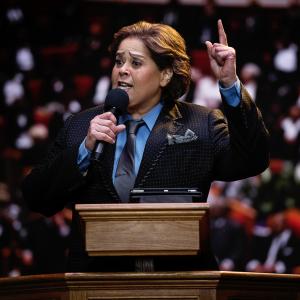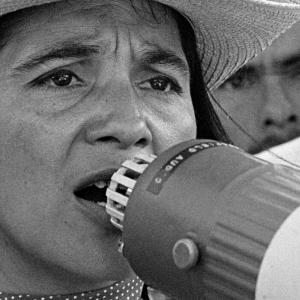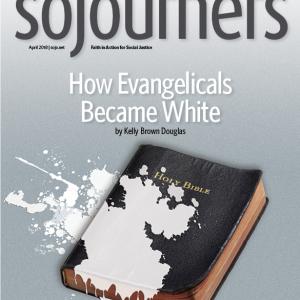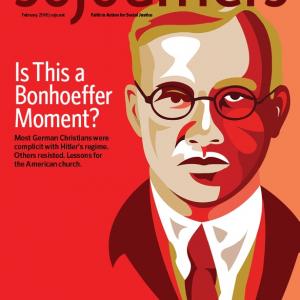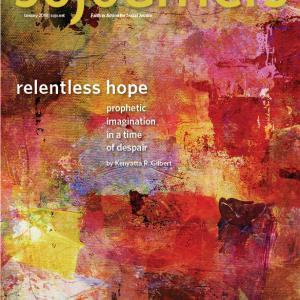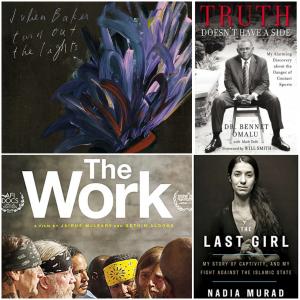Posts By This Author
Letters to the Editor
Letters to the Editor from Sojourners readers
Spirit of Compassion
I read with great interest the article on Northmead Assembly of God’s Circle of Hope AIDS clinic in Zambia (“When the Spirit Comes Down,” by Wonsuk Ma, January 2017), because I spent six months in 2011 conducting research there with support groups for people living with HIV. Clinic clients I interviewed reaffirmed my observations about staff members’ dedication, often reporting that they were grateful that the clinic was in their low-income neighborhood. Most crucially, I noted how staff members showed acceptance and compassion toward all clients. While the clinic faces challenges—long lines, clients who sometimes do not adhere to their medications, excellent staff members who may be “poached” by other donors—it does important work in Zambia’s AIDS response.
Amy Patterson
Sewanee, Tennessee
Charismatic Failure
It is encouraging to hear about the good work being done in Pentecostal churches around the globe (“When the Spirit Comes Down”). However, there was not one word in the article about the plight of homosexuals living in these societies. These churches are often at the forefront of oppressing gay people in the name of religion. Until we all confront the horrific situation of gay people (ostracism, forced marriage, beatings, prison, and execution) in so many places, especially Africa and the Caribbean, I can’t take these churches or their brand of religion seriously.
Robin Van Liew
Holden, Massachusetts
Crowning Achievement?
Thank you for providing a magazine that I am able to count on for intelligence and sensitivity in both your writing and reporting. However, I must take exception to the claim that Elizabeth I “founded” the Anglican Church (“Entering my ‘Power Decade,’” by Catherine Woodiwiss, January 2017). While it is true she is credited for the eponymous settlement, those acts of Parliament did not “found” anything that did not already exist. They smoothed the waters so that the English church could proclaim the gospel in relative peace.
Carlton Kelley
Traverse City, Michigan
Hillbilly Business
I want to thank you for publishing the article by Susan K. Smith on John Rush in your December 2016 issue (“Can Business Be Beautiful?”). It presents a different (and more accurate) example of Appalachia than does J.D. Vance’s book Hillbilly Elegy. As a born-and-bred hillbilly, I take great umbrage at Vance’s book. It is a very courageous memoir of one family, but that’s what it is—the story of one very dysfunctional family and the salutary effects of the Marines on one very mixed-up young man. Most poor and working-class Appalachians have not become as disoriented and dysfunctional as Vance’s family. Many of them, like Rush, have started enterprises of their own or are otherwise engaged at jobs they find rewarding. While not all these businesses are social enterprises as is Rush’s, they all nevertheless indicate successful adjustments to situations in which people find themselves.
Mike Smathers
Crossville, Tennessee
Assets in Heaven
Please do more articles on businesses that have doing good in the world as their bottom line (“Can Business Be Beautiful?”). Business owner John Rush makes a point about the profit-making business model that it is the love of money that is a problem, not having money itself. A current line of research, however, is showing that it isn’t as simple as that; money and decision-making power over others quickly reduce compassionate awareness and behavior. Jesus was right about wealth: Good motivations and intentions are not enough. Any condition that reduces our sense of shared vulnerability with others works against our ability to live lives of universal love.
Arden Mahlberg
Madison, Wisconsin
Letters to the Editor
Letters to the editor from Sojourners readers
Hipster Privilege
D.L. Mayfield’s article (“Church Planting and The Gospel of Gentrification,” July 2017) hit home and is an important conversation. Out of economic necessity after a bout of homelessness, I moved into a neighborhood jokingly referred to as “meth alley” by the uptown people. Our neighborhood health statistics were dismal because of poor access to anything resembling fresh food. When we became the object of “saving” by some churches from the other side of town that wanted to be missional, they didn’t ask us what we needed. We became the project of outreach by young, white, educated, privileged religionists intoxicated by their specialness. The exuberant youths were quite clueless that we had some wisdom about what our neighborhood could use. Most were from two local Bible colleges and had grand ideas about urban outreach.
They planned a hipster coffee shop that the evangelical whites with privilege would use as a base of operation, providing tutoring to our youth. They believed they would open their doors to the unfortunate of my dismal neighborhood and we would come flooding in to be saved by their great goodness from our great need.
I just wanted to recover and get a job. What my saviors failed to see without exception were my strengths—my resilience, the gifts I wanted to bring to my community, and my long experience with making do in the most hostile of circumstances. They could have asked, and I would have told them patiently, but they weren’t listening because they knew all there was to know about poverty and how to fix it.
I didn’t have the gas money to get to church; they were going to Hawaii for a break from us.
My suggestion: If any church or Bible college wants to be missional, ask the community what they most need. Ask who the community leaders already are and help them! Jobs and microloans to small neighborhood businesses are a place to start. Transportation opportunities to those jobs and access to good food are tangible helps. Without giving neighbors the dignity of being understood as people that have much to contribute to our own communities, being “missional” alienates and harms.
Grace Boyd
Sequim, Washington
Summer Psalms
Thanks to Danny Duncan Collum for introducing me to Jessi Colter’s album The Psalms (“Strange and Beautiful Psalms,” July 2017). It is a balm to me during this summer’s heat. Once you hear it, there’s no turning back.
Dennis Abney
Orlando, Florida
New Language Needed
Regarding Leslie Copeland-Tune’s article “What Are Block Grants” in the June 2017 issue: I am frustrated when Medicare and Social Security are called “entitlement” programs. Of course, all who have contributed into each fund during their working lives are entitled to the benefits we receive, but Medicare is a federal health insurance program and Social Security is a federal retirement program. Unfortunately, both funds have been raided by Congress for other purposes and are now in some jeopardy. Perhaps if we used language other than “entitlements,” which gives the impression of being undeserved, these programs would be held in higher regard and protected.
Susan Holcomb
Newberg, Oregon
Letters
Letters to the editors from Sojourners readers.
Letters to the editors from Sojourners readers.
We Cannot Rest; We Must Rest
We cannot afford to abandon the rites and rhythms that sustain us.
HERE'S A PARADOX: If justice delayed is justice denied, we cannot rest while anyone suffers; at the same time, we can’t work tirelessly for justice without rest. It’s the kind of pesky conundrum we face just as we’re settling in for a night of sweatpants and Netflix: The prophets in the Bible decried those who sit on fine couches while their neighbors go hungry ... but does that mean it’s wrong to re-watch the entire season of Queer Eye when we could be doing something more productive?
In this issue, Baptist minister J. Dana Trent uses the fourth commandment (“Remember the Sabbath day, and keep it holy.”) to reframe our quandary. Through this commandment to practice “ritual rest from our labor,” writes Trent, “we opt out of tyranny and opt into care for one another.” At its heart, Sabbath rest isn’t a pause from justice work; it’s a way of disrupting a culture of what Walter Brueggemann describes as “endless desire, endless productivity, and endless restlessness.”
New & Noteworthy: May 2018
Four May recommendations from our culture editors.
From Stage to Screen
Pulitzer Prize finalist Anna Deavere Smith brings her critically acclaimed play Notes from the Field to the screen. Based on hundreds of interviews with students, teachers, parents, and administrators, the production brilliantly highlights the disturbing U.S. school-to-prison pipeline. HBO
Love for Creation
Creation Care: A Biblical Theology of the Natural World presents practical, faithful responses to environmental issues. With scientific data and comprehensive biblical theology, Douglas J. Moo and Jonathan A. Moo invite readers to explore their relationship with creation and the Creator. Zondervan
Letters
Letters to the editors from Sojourners readers.
Susan Thomas
Tucson, Arizona
New & Noteworthy
Four April culture recommendations from our editors.
Yes, She Can
Dolores Huerta changed the course of history when she formed what became the United Farm Workers union with César Chávez. Often overshadowed by her co-founder, Huerta’s defiant resistance, struggle, and sacrifice take center stage in Peter Bratt’s captivating documentary, Dolores. Premieres March 27 on PBS. doloresthemovie.com
An Emerging Voice
Folk singer Azniv Korkejian was born in Aleppo, Syria, to an Armenian family. Relocated to Saudi Arabia and then to the U.S., Korkejian’s moniker, “Bedouine,” is drawn from the name of a nomadic group. With gentle guitar and smooth vocals, her self-titled debut album affirms her identity as a wanderer. Spacebomb
Letters
Letters to the editor from Sojourners readers.
The Present Political Quagmire
The February 2018 issue raises big questions for our country and the evangelical church. The authors of “Is This a Bonhoeffer Moment?” (Lori Brandt Hale and Reggie L. Williams) and “When Seminary Becomes a Threat” (Wesley Granberg-Michaelson) rightly point out the risks of making parallels between two different historical contexts (Germany in the 1930s and 21st century America). Yet there are striking similarities, particularly the ease with which evangelical Christians, in America today and in Germany then, accepted populist movements and their nationalistic programs. In both cases, the populist forces were able to exploit societal anxieties and make a sentimental appeal to a cultural form of Christianity that served its purposes.
The slogan of the Nazified German Christians was “Germany our goal, Christ our power!” Based on a distorted interpretation of Lutheran theology, a group of theologians at the time issued a document, known as the Ansbacher Ratschlag, opposing the Barmen Declaration. It was addressed to the National Socialist Evangelical Union of Pastors and included this statement: “... we as believing Christians thank the Lord God that in this hour of need he has given our people the Fuhrer as a ‘good and faithful sovereign,’ and that in the Nationalistic Socialist state he is endeavoring to provide us with disciplined and honorable ‘good government.’” This distant mirror of attitudes—and even words—that are with us today should give Christians great concern. The vulnerability of the American church did not come about in the presidential election of November 2016. The present political quagmire has only exposed it.
Dave Shelman
Corbett, Oregon
Acknowledging Assault
I have just read “‘A Terrorist War Against Women,’” by Serene Jones (February 2018). Reading stories of sexual violence against women gives me hope that something can be done about that evil. But there is one voice that is not heard too often. It is that of sexual violence against men by male authority figures. I suspect there are many men out there who trusted a male authority figure and were assaulted. We are hurting.
Anonymous
On Rage and Apathy
If our beliefs paralyze us from participating in the systems, what good are they?
IN THIS ISSUE, Victoria Newton Ford writes about Ava DuVernay’s forthcoming movie adaptation of Madeleine L’Engle’s bestselling fantasy novel A Wrinkle in Time. As in the book, Meg Murry travels through time to find her missing father. But DuVernay, who also directed Selma (2014) and 13th (2016), adds a twist. In the film, Meg and her brother, Charles Wallace, are black. For Ford, this delivers something the novel cannot: “a hero of the universe who, in our current political space and time, is afforded the least agency.” In other words, writes Ford, “Meg is an angry black girl.”
A film that depicts a black protagonist—in all her fury, pain, and love—is especially radical, Ford explains, because America has continually “sought to conscript ... black [women] into a toolbox for the country’s deliverance.” She points to the political heroization of Oprah, Michelle Obama, and the black women voters in Alabama who defeated Roy Moore’s senatorial bid.
New & Noteworthy
Four March culture recommendations from our editors.
A Returning Voice
Songwriter Audrey Assad, daughter of a Syrian refugee, releases her first album of original material in four years. Evergreen features songs about “rebirth, the rebuilding of trust, and the discovery of joy and love.” PledgeMusic
Respect for Refugees
Artist and activist Ai Weiwei brings the global refugee crisis to the big screen through his captivating documentary Human Flow. Filmed in 23 countries, the documentary features stories of desperation, courage, and resilience and speaks to our shared humanity. humanflow.com
Letters
Letters to the editor from Sojourners readers.
A Prophetic Exchange
“How God Intervenes” (January 2018), with Kenyatta Gilbert and Walter Brueggemann, is a wonderful interview. How blessed we are to have these two wise and articulate prophets among us. There is so much insight in their challenging and inspiring exchange.
Joan O’Brien
Wethersfield, Connecticut
Political Drama, Then and Now
We are not the first to grapple with a leader whose only regard is for himself.
““DRAMATIC, POLITICAL, incendiary.” They seem like words you’d see splashed across the dust jacket of Fire and Fury, the controversial account of the Trump White House that generated a firestorm of presidential tweets when it was released earlier this year. But in this issue, Bible scholar Reta Halteman Finger uses those words to describe an older form of political drama: the book of Revelation.
Despite Revelation’s reputation as a harbinger of doom, Finger explains that the final book in the New Testament needs to be understood as an example of apocalyptic resistance literature, a genre of writing originally “intended to bring hope during times of political uncertainty or persecution.” This hope isn’t rooted in imperial acts of violence; it’s rooted in the victory of the Lamb, slaughtered but resurrected.
New & Noteworthy
Four February culture recommendations from our editors.

image via pbs.org
A Voice of Compassion
Artist and activist Mavis Staples speaks to the increasing social divide in her latest album, If All I Was Was Black. In this interracial and multigenerational project, Staples doesn’t shy away from anger but, as always, her ultimate message is the promise of positive change. Anti- Records
Peacemaking with Purpose
Jon Huckins and Jer Swigart, co-founders of The Global Immersion Project, believe peacemaking practices should be grounded in Jesus’ teachings. Mending the Divides: Creative Love in a Conflicted World is full of stories, insights, and questions for discussion and shows what it means to live as a true global citizen. InterVarsity Press
Letters
Letters to the editor from Sojourners readers
Letters to the editor from Sojourners readers.
Beyond a Caricatured Hero
Revisiting Bonhoeffer's faith in a time of nationalism.
THE PAGES OF this magazine rarely feature scathing reviews, but in 2011 we made an exception.
That year, in our February issue, we published Nancy Lukens’ critique of Bonhoeffer: Pastor, Prophet, Martyr, Spy, by Eric Metaxas. Lukens, a German professor who translated many of Dietrich Bonhoeffer’s works into English, described the book as “stunningly flawed,” and lambasted Metaxas for trying to sculpt the 20th-century German pastor into an evangelical warrior on a crusade against liberal Christianity. Metaxas “does both Bonhoeffer and contemporary readers a gross disservice in implying that evangelicals are immune from the tragic error of merging nationalistic fervor with Christian piety,” wrote Lukens.
Fast forward seven years: Metaxas’ Bonhoeffer biography boasts a bestseller sticker, and a resurgence of nationalistic fervor helped win Donald Trump the White House—and the explicit support of many white evangelical leaders, including Metaxas.
Dreaming of A New World
The core of the prophetic vocation isn’t merely to rebuke unjust systems.
IN WALTER BRUEGGEMANN'S first article for Sojourners, published in November 1983, he described the “radical break” we prepare for in Advent as “the Bible’s effort to break our imagination.”
In the decades that followed, Brueggemann’s keen analysis of scripture has called out some of the darkest practices of American empire, including consumerism, gun violence, financial corruption, environmental exploitation, and sexual assault. But while he’s never shied from speaking truth to power, Brueggemann has repeatedly emphasized that the core of the prophetic vocation isn’t merely to rebuke unjust systems, but rather, as he wrote in 1983, “to think a genuinely new thought, to dream of a genuinely new world that will displace the old failed one.”
New & Noteworthy
Four January cultural recommendations from our editors.
Faith in the Dark
Indie rock singer and Memphis native Julien Baker examines sexual identity, Christianity, and mental health in her latest album, Turn Out the Lights. Influenced by the Episcopal Church’s Book of Common Prayer, Baker’s album is a meditation on empathy and unity. Matador Records
Memoir of Survival
Nadia Murad was just 21 years old when she was forced into the ISIS slave trade in northern Iraq. Now a human rights activist, Murad details her narrow escape in The Last Girl: My Story of Captivity, and My Fight Against the Islamic State. Tim Duggan Books
Letters
Letters to the editor from Sojourners readers
Letters to the editor from Sojourners readers
New & Noteworthy
Four December cultural recommendations from our editors.
Heartland Heroes
Best-selling author Miriam Horn of the Environmental Defense Fund brings her timely book Rancher, Farmer, Fisherman to life in a new documentary. Narrated by award-winning journalist Tom Brokaw, the film highlights five surprising “conservation heroes” working to protect the land they love. rancherfarmerfisherman.com
A Daily Gift
In Gift and Task: A Year of Daily Readings and Reflections, renowned Old Testament scholar and theologian Walter Brueggemann provides daily reflection on scripture. Beginning with Advent, Brueggemann invites readers to critically consider the “cost and joy of discipleship.” Westminster John Knox Press
Letters
Letters to the editor from Sojourners readers
Do No Harm
“Clash of Liberties” by Oliver Thomas (Sept.-Oct. 2017) is a great, thought-provoking article. I am a liberal Democrat and support most all liberal causes—especially the right of same-sex couples to live their lives like any non-same-sex couple. I also support the right for anyone to disagree with me, so long as that disagreement does not do harm to others.




